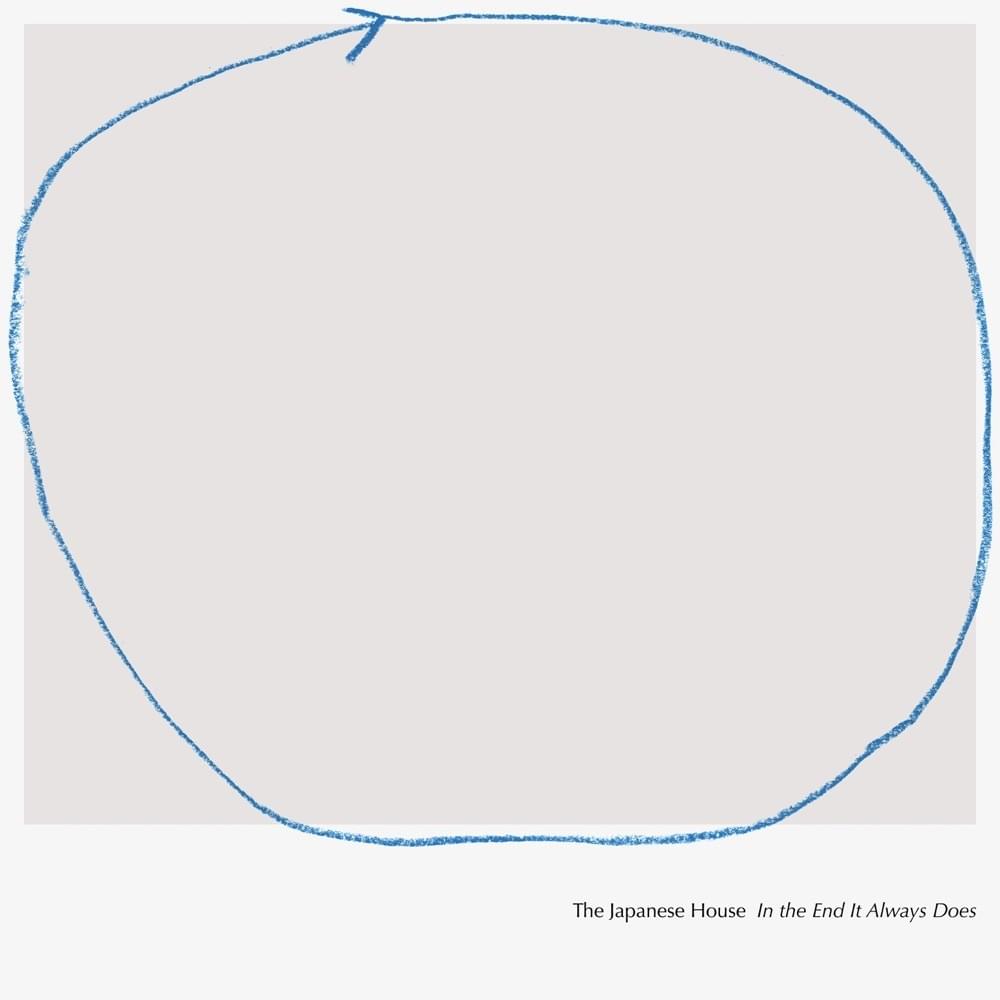★★★★☆
On her second album, Amber Bain, aka The Japanese House, invites us on an introspective journey through love and self-discovery. Here’s our In The End It Always Does review.
On her debut album, The Japanese House (real name Amber Bain) walked us through first love. Good At Falling was a travelogue tribute to her first love, meeting us at its dizzying peak and holding our hand to the rocky end. With the crunchy sounds and vocal effects that have coloured all her prior EPs and captured the attention of a cult legion of fans, it felt full of emotional peril and panic as she gripped to something slipping.
But you can feel the fingers slip from the first lines of ‘Spot Dog’, the opening track of her second album. Repeating the simple sentiment of “I don’t want to go yet”, the album’s theme is laid out immediately. Taking its title from ‘Sunshine Baby’ (“Putting off the end cause, in the end, it always does”) – the simple poetry of it makes me wish I wrote it. And paired with the hand-drawn arrow on the cover, it’s clear that The Japanese House is no longer concerned with big crashing dramatic endings but with how life will move you from state to state without asking, with the reluctant pulling away from one phase into the next.

Whereas Good At Falling followed a queer love story like a plot, In The End It Always Does feels more like vignettes of existence or a study of queer nuance and life in the in-between moments. It’s scenes of staying friends with your ex, meeting their new girlfriend, wondering if you love someone or want to be them, returning to that place a year after the breakup and analysing the funny feeling in your tummy. No big splash exists, but The Japanese House is diving into deeper emotional territory.
READ MORE: The 1975 at Gorilla review | Matty Healy and co. distil the essence of their very best
And the instrumental matches up beautifully. Still keeping the same hefty production and effects that make up The Japanese House’s singular and identifiable sound, it’s married with something simpler. Merging classical piano with strings, vocoders, blocky synths, chunky reverb and far more guitar than we’ve heard from the artist before – the mix of electro elements with sparser and more traditional details makes for a fascinatingly layered and generally stunning listen. So much space seems to have been made for artistic development since the debut, but maybe more than that, an area has been made for Amber’s own catharsis.
View this post on Instagram
Amber repeatedly brings the reader deep into her inner world throughout the album. Tracks like ‘Morning Pages’, featuring MUNA’s Katie Gavin, and ‘Indexical Reminder Of A Morning Well Spent’ feel almost diaristic, throwing away traditional song structure for a spontaneous feel. The lyrics move between the deeply specific and the secretive, pointing towards personal reference points or inside jokes as though they’re written for one person in particular to hear.
It harks back to the unknown sparsity of her earlier Pools To Bathe In EP, but with less vocal effect. This time it feels rawer. It’s almost as if The Japanese House has finally realised that she has a beautiful voice, letting her vocals lead the way throughout this project. The closer ‘One For Sorrow, Two For Joni Jones’ is incredibly moving. So simple and tender, it’s a vulnerable one for The Japanese House, and as the final notes play out, the listener should feel lucky to have been trusted with the track.
But amongst the tenderness, In The End It Always Does houses some of this year’s best pop songs. Singles Sad To Breathe’, ‘Boyhood’ and ‘Sunshine Baby’ are instant earworms produced to perfection and balance nuanced, poetic lyricism with immediately catchy energy. ‘Sunshine Baby’ especially feels like a categorically perfect pop song. With vocals from The 1975’s Matty Healy (he and George remain long-time collaborators of Amber’s), everything about the track, from the subtly gutting lyrics, soaring choruses and flawless feature, make up a genuine song of the year contender.
READ MORE: Matty Healy and Taylor Swift | The story so far…
Elsewhere, ‘Sad To Breathe’ delivers danceable devastation similar to fan favourites like ‘Maybe I’m The Reason’. In all the bigger tracks, George Daniels’ presence is clear, but not in the wrong way. ‘Friends’ and ‘Sad To Breathe’ both feel like they would fit perfectly on The 1975’s A Brief Enquiry Into Online Relationships because both tracks continue to pioneer new sounds in the indie pop genre. Mixing The Japanese House’s poetic streak and unafraid approach to experimentation with the maximalism of The 1975’s endless invention – it’s a match made in heaven that seems to keep getting better and better.
As the first single of the new era, ‘Boyhood’ remains a standout. The opening lines still stun me, singing, “I could’ve been somebody else, but I was out looking for me”, plainly over a simple instrumental. If the album is vignettes of existence, ‘Boyhood’ feels like a ribbon tying it all together. Singing, “I want to meet somebody new, change beneath the evening light”, Amber isn’t looking at one great love on this album, but instead how queer love especially can be a vehicle to knowing yourself, how another person can reflect you or how you can hide from yourself in them.
No one track on this album considers outright euphoric love or devastation. There is no big breakup song. Instead, we see the moments just before or after, a month on, a year on, a random Tuesday after the fact. In The End It Always Does is as gentle as it is significant, as simple as it is specific, and as intellectual as it is personal. It’s a leap from her debut as The Japanese House continues to assert herself as a leader in her own realm, refusing to stick to one genre or sound but gathering up a bit of everything to soundtrack her inner world.





